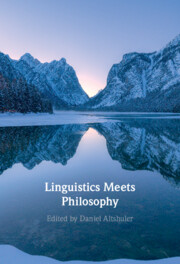Book contents
- Linguistics Meets Philosophy
- Linguistics Meets Philosophy
- Copyright page
- Contents
- Figures
- Tables
- Contributors
- Linguistics Meets Philosophy: A Historical Preface
- Introduction
- Part I Reporting and Ascribing
- Part II Describing and Referring
- Part III Narrating and Structuring
- Part IV Locating and Inferring
- Part V Typologizing and Ontologizing
- 9 A Typology of Semantic Entities
- 10 Nonfinite Verbal Forms and Natural Language Ontology
- Part VI Determining and Questioning
- Part VII Arguing and Rejecting
- Part VIII Implying and (Pre)supposing
- Index
- References
10 - Nonfinite Verbal Forms and Natural Language Ontology
from Part V - Typologizing and Ontologizing
Published online by Cambridge University Press: 06 October 2022
- Linguistics Meets Philosophy
- Linguistics Meets Philosophy
- Copyright page
- Contents
- Figures
- Tables
- Contributors
- Linguistics Meets Philosophy: A Historical Preface
- Introduction
- Part I Reporting and Ascribing
- Part II Describing and Referring
- Part III Narrating and Structuring
- Part IV Locating and Inferring
- Part V Typologizing and Ontologizing
- 9 A Typology of Semantic Entities
- 10 Nonfinite Verbal Forms and Natural Language Ontology
- Part VI Determining and Questioning
- Part VII Arguing and Rejecting
- Part VIII Implying and (Pre)supposing
- Index
- References
Summary
This chapter will argue that the ontological categories that we require for understanding meaning and meaning composition in natural language cannot be exclusively proxied by external objects in the world or judgments of truth. In other words, a set of metaphysically justified ontological objects is not what is required for natural language ontology, and the latter field should be considered a distinct philosophical and analytical exercise. The chapter takes as its central empirical ground the meaning of ’nonfinite’ verb forms in English. Paradoxes relating to the English progressive and passive constructions will be examined to show that lexical conceptual content needs to be defined more essentially, and that the integration of such essentialist content into forms which ultimately have extensionalist import requires the reification of the symbol qua symbol and the explicit representation of the utterance situation.
- Type
- Chapter
- Information
- Linguistics Meets Philosophy , pp. 302 - 334Publisher: Cambridge University PressPrint publication year: 2022
References
- 1
- Cited by

